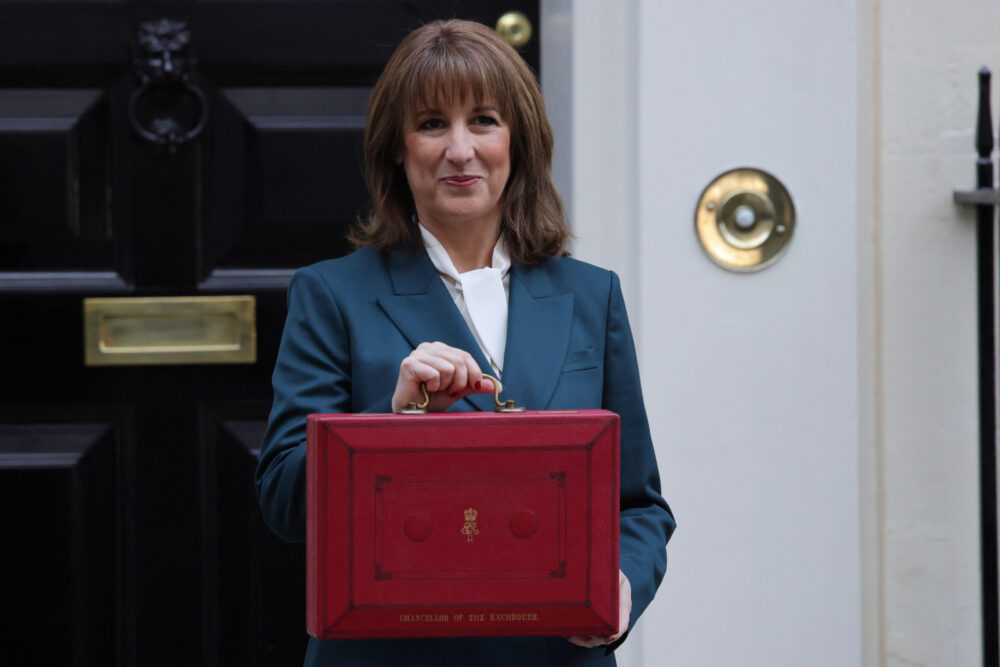The government is set to scrap co-investment payments that small and medium-sized employers have to pay for apprentices under the age of 25.
Chancellor Rachel Reeves has also set aside £820 million to fund her promised “youth guarantee” for young people aged 18 to 21 over the next three years.
Reeves made the announcements during today’s budget speech before the Treasury revealed further tweaks to the apprenticeship system in the chancellor’s red book, including removing the 10 per cent top up for levy payers and halving the time big businesses have to use their funds.
Reeves told the House of Commons: “Today I am announcing funding for training for under 25 apprenticeships completely free for small and medium-sized enterprises.
“And funding for our new youth guarantee, providing £820 million pounds over the next three years to give young people who are let down by the Conservatives the support and the opportunity that they deserve, guaranteeing every young person a place in college, an apprenticeship or personalized job support, and after 18 months, 18 to 21 year olds will be offered paid work, not benefits.”
Co-investment ends for under 25s
Since the apprenticeship levy was introduced in 2017, only large employers with a payroll in excess of £3 million pay into the levy at a rate of 0.5 per cent of salary costs.
The contributions go towards funding all parts of the apprenticeship system, including 95 per cent of training of apprentices in non-levy paying businesses. SMEs then make a co-investment payment of 5 per cent.
In 2024, the Conservatives scrapped the 5 per cent co-investment payment for SMEs when they hire an apprentice under the age of 22.
Reeves today announced she will extend this co-investment relief to those aged 22 to 24.
It is unclear whether this change will kick in immediately or from the new financial year in April 2026.
The move will be funded from an extra £725 million set aside over this Parliament “to help support apprenticeships for young people” under 25, according to Budget documents.
Other big levy changes for big businesses
The documents added that alongside this funding, the government will introduce new reforms to “simplify the apprenticeship system and make it more efficient” as short courses are introduced from April 2026 when the apprenticeship levy is reformed into a “growth and skills levy”.
This will include:
- Removing the additional [10 per cent] uplift to levy accounts;
- Changing the expiry window to 12 months [from the current 24 months];
- Changing the government’s co-investment rate to 75 per cent [from currently 95 per cent] for levy-paying employers once they have exhausted all their fund
The Treasury also said government will continue “working with employers to streamline the suite of apprenticeship standards available”.
More details on these policy changes “will be announced shortly”.
Minimum wage rates for all workers, including apprentices, will also rise from April. Apprentices aged under 19, and 19 and over in their first year, will be paid at least £8 per hour, up from the current £7.55 minimum. This also applies to working 16- and 17-year-olds not doing apprenticeships.
The mininimum wage for 18-20 year olds will rise to £10.85 per hour and the national living wage for workers aged 21 and over rises to £12.71 per hour.
Levy receipts to hit £5bn by 2030
Meanwhile, the government’s spending watchdog has today updated its forecasts of how much money the apprenticeship levy is expected to raise.
The Office for Budget Responsibilities now estimate the levy will raise £4.4 billion in 2025-26 – £200 million more than they forecast in March.
The Treasury has this year set an apprenticeship budget for England of £3.075 billion while the devolved nations receive just over £500 million. It means the top-slice the Treasury takes between how much the levy generates and how much is dished out for apprenticeship spending hits around £820 million.
Forecasts for 2026-27 show the levy intake will rise to £4.6 billion in 2026-27. If the Treasury fails to increase apprenticeship spending budgets then the Treasury margin will hit £1 billion.
And the OBR now expects the levy to raise £5 billion for the first time by 2029-30.
England’s apprenticeship budget is at breaking point and went overspent for the first time last year.
Ben Rowland, CEO of the Association of Employment and Learning Providers, said: “There’s a bitter irony in Rachel Reeves’ ‘Bingo Budget’.
“Government is wrestling with how to create the growth the country needs, while urging employers to do more on productivity, investment and for wider society. Yet an obvious and pre-funded solution is sitting right under its nose, and one that employers will back: investing in apprenticeships.
“And as a bonus, with levy receipts set to burst the £5 billion mark, releasing a substantial portion of the Treasury’s apprenticeship levy topslice is the one tax rise the chancellor doesn’t even need to announce, because it happens automatically.”
Charlotte Bosworth, CEO of apprenticeship training giant Lifetime Training, added: “While the increased funding for apprentices under the age of 25 is a positive step, the continued withholding of unspent apprenticeship levy funds is also a missed opportunity to address the urgent challenge of young people not in employment, education, or training (NEETs).
“With nearly a million young people in this position, greater funding is essential to ensure fair access to career opportunities and to support the government’s ambitions for growth and reduced unemployment.”
Youth guarantee spending revealed
The £820 million youth guarantee will offer a six-month paid work placement for every eligible 18 to 21-year-old who has been on Universal Credit and looking for work for over 18 months.
The government said this will help young people across the UK take the first “crucial step” into sustained employment.
An estimated 12.7 per cent, or 946,000, of 16 to 24-year-olds were not in education, employment or training (NEET) in July to September this year, down 0.3 per centage points on the year.
It follows eight youth guarantee “trailblazers” overseen by regional mayors that have been testing a range of initiatives aimed at reducing youth inactivity and unemployment.
Each area has been allocated £5 million for 2025-26 and a further £5 million for their programmes to run until April 2027.















I’m interested